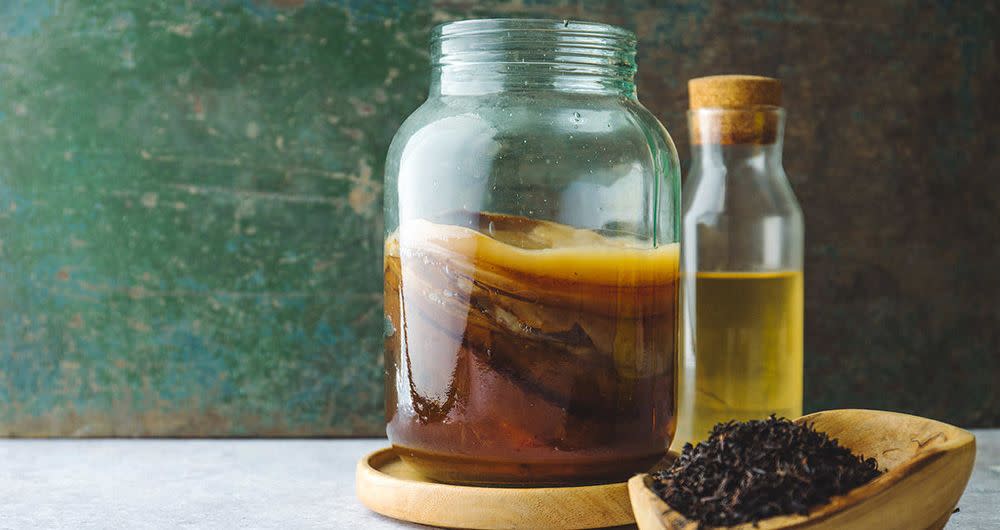What Is Kombucha?

Photo: Max D Photography/Shutterstock.com
Cream or sugar with your tea? How about bacteria? Kombucha, a concoction of bacteria, tea and sugar, is definitely having its 15 minutes of fame. Fans claim the popular tea-based drink provides a string of health perks, such as improved digestion, less stress, and more energy. The potent drink has a vinegar-like smell and a taste that has been described as everything from rotten apple cider to fizzy, tart apples (we’ll take the latter). Can this at-home drink cure what ails you? Here’s what you need to know before you sip.
What’s the Deal?
Though kombucha is all the rage right now, it’s hardly a new kid on the block. The tea dates back 2,000 years to ancient China, where it was regularly consumed to remedy inflammatory ailments such as arthritis and thought to ward off cancer. More recently, kombucha enthusiasts have used the beverage as an at-home remedy for acne, fatigue, hypertension, headaches, and constipation.
Kombucha is surprisingly easy to make at home—it just requires tea, sugar, and an active starter culture of bacteria and yeast (read on to learn about potential risks involved in home brewing). The culture, known as the “mother culture,” is combined with tea—usually black or green—and sits for roughly 10 days. During this time, a thin colony of bacteria forms on top. After the fermentation process is complete, the new culture can be scooped out and used to start other brews, while the pungent beverage below is ready for drinking. (Related: There's No Way of Knowing How Much Sugar Is Really In Your Kombucha)
Why Do People Care?
Grocery store shelves and trendy restaurants alike are featuring fermented foods like kefir, sauerkraut, kimchi, and yes, kombucha. All kinds of people, from health nuts to celebrities to chefs, are becoming more conscious of the benefits of eating grub rich in healthy probiotics, which are tiny microorganisms similar to the “good bacteria” naturally found in our intestines. Research has found consuming probiotics can help fight colds, lower cholesterol, and promotes a healthy gut, alleviating issues such as irritable bowel syndrome, diarrhea, and food allergies. (Related: Ugly Foods You Should Be Eating)
Although kombucha’s purported benefits sound impressive, as of right now, studies on the tea have only been performed on our rodent friends. The existing results sound promising though. One study found rats that who gulped down the fermented beverage and were subsequently exposed to stress produced more antioxidants and had less DNA damage than their tea-free pals. Plus, kombucha actually reversed the damaging effects of stress on their immune systems. Related research found that kombucha also prevented the reduction of antioxidants in stressed out rats. Some experts also suggest that kombucha is a good source of B vitamins, known to regulate metabolism and energy, as well as contribute to a healthy heart, skin, and nails.
The Verdict
The fermented tea’s health benefits certainly make it sound appealing, but because regular folks (who might not brew in the most sanitary conditions) often make kombucha in uncontrolled environments, it stirs up a few concerns. With a good chunk of bacteria floating around (in the culture and the air), brews have the potential to be easily contaminated and can lead to some unpleasant situations like upset stomachs and in one instance, even death. Making kombucha in ceramic pots is especially dangerous, as the acids in the tea draw out lead from the glaze, contaminating the beverage with toxins.
There has also been uncertainty about kombucha’s alcohol content, which is a natural by-product of fermentation (a similar process occurs when making wine or beer). In 2010, Whole Foods pulled some kombucha off shelves, concerned that certain brands continued to ferment after being bottled, producing more alcohol than they claimed. The recipes and labels were tweaked and now most store brews contain less than 0.5 percent alcohol by volume (ABV). Brews that have more booze (and some contain up to three percent alcohol, which is as much as some beers) are considered alcoholic beverages and only sold to those 21 and over. So unless you guzzle several teas back to back—generally only 4 oz. per day is recommended—the chances of getting drunk or even buzzed are pretty slim. And although most batches start out with a hefty cup of sugar, most of the sweet stuff is fermented out, leaving one or two grams per 8oz. serving. To put it in perspective, that’s significantly less sugar than soda and most other bottled drinks like green tea and lemonade. (Related: Kombucha Cocktails for a Refreshingly Healthy Happy Hour)
Bottom line? If you’re convinced about the health perks and don’t mind the sour, vinegary taste, stick to store-bought bottles and skip home brews, which can easily go awry.
More from Greatist:
31 Weird But Awesome Recipes Using Canned Pumpkin
Is Your Squat Deep Enough?
19 Classic Pasta Dishes Made Healthier

